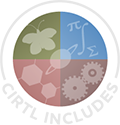What is the Undergraduate Research Mentoring Framework?
The Research Mentoring Framework was based initially on feedback from INCLUDES Summit 1, where attendees were asked what professional development is needed to improve faculty undergraduate mentoring. Following the first summit, the Pfund et al. (2016) paper presented core attributes for mentoring, supported by existing literature and theoretical models. The Undergraduate Research Mentoring Framework maps the feedback obtained from the CIRTL INCLUDES Summit I meeting onto the framework published in the Pfund et al. (2016) paper. The vast majority of the listed Attributes and Example Measurable Learning Objectives were matched with the input obtained from Summit I, indicating that there was a significant alignment between CIRTL Summit I members’ opinions about inclusive and effective mentoring and the Pfund et al (2016) paper. For the Summit I input that did not match with a corresponding attribute within the framework, new categories were added, namely the Mentoring Models and Institutional Level categories.
The Undergraduate Research Mentoring Framework includes several practices that promote an effective relationship, separated between Mentors and Mentees. Both of these major divisions are then further subdivided in categories, as described below.
Navigating the Undergraduate Research Mentoring framework
The Research Mentoring Framework is divided into two main sections based on the role of the individual described in the framework: Mentors or Mentees. Within each major section, there are Categories which organize the related Attributes for either the Mentors or Mentees. The Categories are the same for BOTH Mentors and Mentees: Research, Interpersonal Skills, Psychosocial & Career, Culturally responsive/diversity, Sponsorship, Mentoring Models, and Institutional Level.
Attributes lists skills and attributes which are organized within the relevant Categories listed above. Like the Categories, Attributes are matched between Mentors and Mentees. Example measurable learning objectives delineates the specific roles or learning outcomes required separately by Mentors and Mentees. The framework also offers evidence from INCLUDES Summits 1 and 2 and additional resources.
Guide to the Mentoring, Advising, and Pedagogy Frameworks (PDF)
Undergraduate Research Mentoring Framework (PDF)
Pfund, C., et al. (2016) Defining attributes and metrics of effective research mentoring relationships.” AIDS and Behavior 20(2): 238-248.
